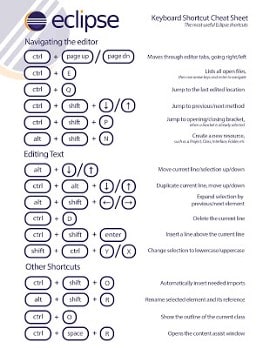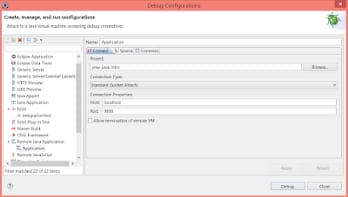Disclosure: This post includes affiliate links; I may receive compensation if you purchase products or services from the different links provided in this article.
Hello guys, Eclipse and JUnit are two of the essential tools for Java Developers. Eclipse is a Java IDE, Integrated Development environment which allows you to code, run and debug Java program from a single window, while JUnit is a unit testing library that allows you to test your Java code automatically.
You can write JUnit tests and then you can run them automatically using Maven or Gradle plugin at build time. You can further automate your build using Jenkins which means your Unit test will run continuously and automatically, reporting any break at the earlier possible opportunity.
Most of the Java developers spend the whole workday on Eclipse writing code, running them, and debugging them. That's why it's very important for you to have a good understanding of both Eclipse in JUnit. It also helps to know your tools to be good at what you are doing.
In the past, I have shared Eclipse and JUnit books to improve your knowledge and skills about these two fundamental tools, and today I am going to share some of the free online courses from Udemy and Pluralsight which you can join to improve your JUnit and Eclipse skills.
I have also included some courses on Mockito, Test Driven Development, Cucumber, and Selenium as they are important tools for test automation.
These courses are particularly good for beginners and you will learn everything you need to work in Java effectively.
By learning this tool at the start of your career, you will save a lot of time for writing and running your code. Btw, intermediate developers can also benefit from these courses.
These courses are good for any Java developer who wants to learn Eclipse and JUnit or either of the technology from scratch. Some of these courses are absolutely free so there is no reason why you can't join them.
10 Free JUnit and Eclipse Courses for Java Programmers
Learning a new technology or programming language is not that easy. You need to spend a considerable time to learn and understand not only the technology but also the tools you need to work effectively, and Java is no different.
Eclipse and JUnit are two of the essential tools for Java developers and a good knowledge of them goes a long way to becoming an effective and powerful Java developer.
When it comes to learning a new technology or tool, my 3 point rule is to join a course, read a book, and do a project. In order to learn Eclipse or JUnit, you can also adopt the same approach.
You can start with these courses then you can follow these Eclipse and JUnit books and once you have a good understanding of both technology and tool then you can start doing projects.
1. Eclipse Tutorial For Beginners
This is one of the awesome courses to learn the basics of Eclipse for free. The course is designed for beginners and first times and it not only teaches but also shows how to do stuff in Eclipse.
In this course, you go on a fun ride with Eclipse. After completing the course, you should have a number of Eclipse tips and tricks up your sleeve. You will also understand various features of Eclipse --- Views, Perspectives, Debugger, Save Actions, Plugins, and Code Generation.
The course will also improve your productivity with Eclipse Shortcuts and you will also learn to import projects from Git and the basics of Maven projects. Overall a good course to start with Java Development with Eclipse.
2. Eclipse IDE for Beginners: Increase Your Java Productivity
This is another beginner-level course on Eclipse for Java developers. You can take this course to learn how to develop a Java application with Eclipse.
The course will teach you how to install Eclipse and customize Eclipse for your environment using useful plugins. You will also learn how to create Java applications in Eclipse and how to run and debug them right from Eclipse.
The course also teaches you how to make use of a number of Eclipse productivity techniques such as navigating the source code, generating source code, and creating unit tests. The course wraps by showing you how to import and export projects from Eclipse.
3. Eclipse tips and tricks
As the title suggests this course is focused on teaching some useful Eclipse tips and tricks. Most of the Java developers remain content by just knowing how to create a Java project and run that from Eclipse.
They never really utilize the full potential of Eclipse by learning keyboard shortcuts and productivity tips and tricks like the one shown in this course.
This course not only tells you how to run and debug your program but also some advanced tips about dealing with character encoding, Eclipse built path configuration, using Maven with Eclipse and faster installing of the plugin you need for better productivity.
It also teaches you how to work behind a corporate proxy and how to connect to the maven repository and Eclipse marketplace from a corporate network. Overall, a fantastic course to upgrade your Eclipse knowledge free of cost.
4. JUnit Tutorial for Beginners --- Learn Java Unit Testing
JUnit is another skill which many Java developer posses but not just good enough. Most of the Java developer I have met and interviewed knows what is a JUnit and have written one or two trial JUnit tests but they never really use JUnit to test their live project or new code they are writing every day.
Most of them will give you excuses like there is always delivery pressure, absolutely no time to write unit tests or TDD but the main reason for avoiding unit testing is often low confidence and not having enough skill and experience to write a unit test for any kind of code.
This JUnit tutorial will help you to bridge that gap and teach you all essential concepts of unit testing and JUnit testing framework.
In nutshell, this course will teach you:\
how to create a new project for JUnit Tests\
how to create, Run & Debug JUnit Tests\
how to write Good Unit Tests\
how to use assert methods\
how to use basic JUnit Annotations --- @test
, @Before, @After, @AfterClass, @BeforeClass, @suite
\
how to test Performance and Exceptions in Unit Tests\
how to write Parameterized Tests\
Adhere to JUnit Best Practices
And, most importantly how to use eclipse to write and run JUnit Tests for your Java code.
5. Unit Testing In Java With JUnit
This is another good unit testing course for Java developers. In this course, John explains the basics of JUnit and guiding you to write your first unit tests.
Once the basic is covered you will be introduced to the advanced concept which will help you to write clean tests and use best practices like DRY for creating maintainable test code.
After that, you will learn how to integrate JUnit with your existing Ant or Maven build system and how you can automate the creation of JUnit reports.
Finally, he'll wrap things up by going beyond the basic uses of JUnit by learning how to use stubs and mocks to really isolate classes and we'll also learn how to use JUnit for more than just unit testing.
In short, a good course to learn JUnit in a quick time and start writing your first unit test.
Btw, this course is not really a free course. You need a Pluralsight membership to access this course. A monthly membership will cost you around $29 and the annual one will be around $299, which gives you access to more than 5000 programming and development courses.
Though I encourage you to join Pluralsight to give your learning a boost, if you want, you can also take this course for free by signing up for a 10-day free trial, which is more than enough to complete this course.
6. Learn Unit Testing with Junit & Mockito in 30 Steps
This course will teach you Mockito and JUnit --- the most popular unit testing and mocking frameworks --- with 25 Examples. This course is very helpful.
Explanations are clear, simple, and easy to understand. I learned the basic concepts of Junit, Mockito, and PoweMockito. I am using this knowledge for a project at work.
Here is the link to join the course ---Learn Unit Testing with JUnit and Mockito
7. Java Unit Tests for Beginners: JUnit 5 for your first IT job
Learn to write Java unit tests in practice with JUnit 5. Online course with exercises and an extra JUnit cheat sheet. The course is simple and clear, maybe a bit too fast for people who never wrote a unit test before.
However you can always pause the lesson and catch up, so this won't be that much of a problem. If you already wrote unit tests before(e.g. with JUnit 3/4) it's pretty easy to follow your instructions.
Here is the link to join the course --- Java Unit Tests for Beginners (JUnit 5)
8. Instant Test-Driven Development with Java, JUnit, and Mockito
This course provides very good coverage of TDD and a reasonably deep dive into JUnit and Mockito. Well presented with good examples and solid advice. The only reason I dropped it half-a-star was due to inconsistent volume between video clips which was a little annoying but the general content is excellent.
Here is the link to join the course --- TDD with Java, JUnit, and Mockito
9. Cucumber with Java-Build Automation Framework in lesser code
This is a great course to build an end-to-end web automation testing framework and simulate user behavior on a web application.
The coverage for this course is amazing and the concepts are explained nicely with a practical session for each concept, which is the best part about this course.
10. Selenium WebDriver with Java -Basics to Advanced+Frameworks
This is a great course to join if you want to do test automation in Java application. It's both detailed and comprehensive and covers a wide range of topics and tools like Maven, Git, Jenkins, TestNG, ANT, Log4j, Cucumber, and much more.
That's all about some of the best JUnit and Mockito online training courses you can take to learn and improve your unit testing skills in Java. I have also included some courses to learn Mockito, Cucumber, and Selenium for advanced testing and automation.
As I have said many times, unit testing skill is essential for professional software developers and there is no excuse for not writing automated unit and integration test at the age of DevOps. Candidate's unit testing skill is also tested during the interview and often candidates with good unit testing skills are preferred.
Other Free Online Courses you may like to explore
5 Free Courses to Learn Maven and Jenkins
5 Free Courses to Learn Git and Github
5 Courses to Learn Big Data and Apache Spark
5 Free Docker Courses for Java and DevOps Engineer
5 Free Courses to Learn Python from scratch
5 Free Courses to Learn Data Structures and Algorithms
5 Free Spring Framework Courses for Java Developers
5 Online training courses to learn Angular for Free
5 Free Linux Courses for Application Developers and Sysadmins
Top 10 Java and Web Development Courses from Udemy
Thanks for reading this article so far. If you like these free Eclipse and JUnit courses then please share with your friends and colleagues. If you have any questions or doubt then please drop a note.









Top comments (0)